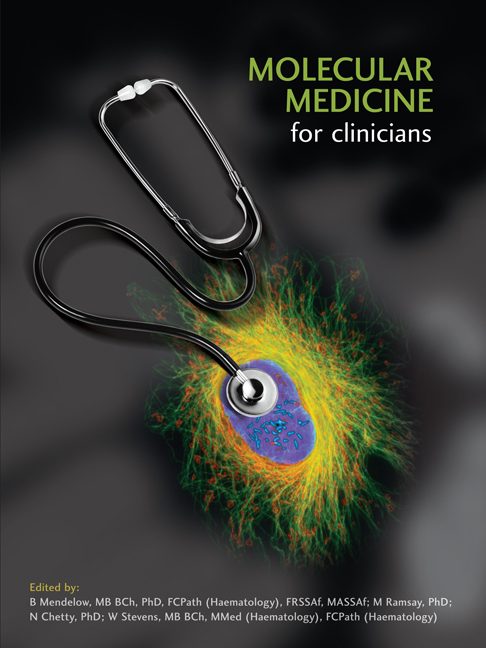Book contents
- Frontmatter
- Contents
- Foreword
- Acknowledgements
- Chapter 1 Introduction
- Keynote Essay 1: Defining Who We Are: DNA in Forensics, Genealogy and Human Origins
- Section 1 Principles Of Cellular And Molecular Biology
- SECTION 2 MOLECULAR PATHOLOGY
- Chapter 8 Genomes and the Environment: An Overview of Molecular Pathology
- Chapter 9 Genetics, Genomics, Health and Disease: General Considerations
- Chapter 10 Chromosome Disorders
- Chapter 11 Mendelian Inheritance
- Chapter 12 Unusual Molecular Processes that Impact on Disease
- Chapter 13 Population Genetics
- Chapter 14 Complex Multifactorial Inheritance
- Chapter 15 Molecular Basis for Phenotypic Variation
- Chapter 16 Medical Genetics
- Keynote Essay 3: Human Cloning: Should We Go There?
- Chapter 17 Neoplasia: General Considerations
- Chapter 18 Oncogenes
- Chapter 19 Mammalian DNA Repair
- Chapter 20 Tumour Suppressor Genes and Inherited Susceptibility to Cancer
- Chapter 21 Carcinoma
- Chapter 22 Leukaemias and Lymphomas
- Chapter 23 Molecular Approaches to the Diagnosis, Prognostication and Monitoring of Cancer
- Keynote Essay 4: Microbes, Molecules, Maladies and Man
- Chapter 24 Molecular Basis of Infectious Diseases: General Considerations
- Chapter 25 Immunology
- Chapter 26 Human Immunodeficiency Virus
- Chapter 27 Tuberculosis
- Chapter 28 Malaria
- Chapter 29 Influenza
- Chapter 30 Oncogenic Viruses
- Chapter 31 Vaccines and Immunisation
- Keynote Essay 5: Drugs and the 21st Century
- SECTION 3 MOLECULAR THERAPEUTICS
- SECTION 4 RESEARCH AND THE CONTINUING EVOLUTION OF MOLECULAR MEDICINE
- Glossary
- Contributors’ Biographies
- Source Material And Recommended Reading
- Permissions And Credits
- Index
Chapter 20 - Tumour Suppressor Genes and Inherited Susceptibility to Cancer
from SECTION 2 - MOLECULAR PATHOLOGY
Published online by Cambridge University Press: 04 June 2019
- Frontmatter
- Contents
- Foreword
- Acknowledgements
- Chapter 1 Introduction
- Keynote Essay 1: Defining Who We Are: DNA in Forensics, Genealogy and Human Origins
- Section 1 Principles Of Cellular And Molecular Biology
- SECTION 2 MOLECULAR PATHOLOGY
- Chapter 8 Genomes and the Environment: An Overview of Molecular Pathology
- Chapter 9 Genetics, Genomics, Health and Disease: General Considerations
- Chapter 10 Chromosome Disorders
- Chapter 11 Mendelian Inheritance
- Chapter 12 Unusual Molecular Processes that Impact on Disease
- Chapter 13 Population Genetics
- Chapter 14 Complex Multifactorial Inheritance
- Chapter 15 Molecular Basis for Phenotypic Variation
- Chapter 16 Medical Genetics
- Keynote Essay 3: Human Cloning: Should We Go There?
- Chapter 17 Neoplasia: General Considerations
- Chapter 18 Oncogenes
- Chapter 19 Mammalian DNA Repair
- Chapter 20 Tumour Suppressor Genes and Inherited Susceptibility to Cancer
- Chapter 21 Carcinoma
- Chapter 22 Leukaemias and Lymphomas
- Chapter 23 Molecular Approaches to the Diagnosis, Prognostication and Monitoring of Cancer
- Keynote Essay 4: Microbes, Molecules, Maladies and Man
- Chapter 24 Molecular Basis of Infectious Diseases: General Considerations
- Chapter 25 Immunology
- Chapter 26 Human Immunodeficiency Virus
- Chapter 27 Tuberculosis
- Chapter 28 Malaria
- Chapter 29 Influenza
- Chapter 30 Oncogenic Viruses
- Chapter 31 Vaccines and Immunisation
- Keynote Essay 5: Drugs and the 21st Century
- SECTION 3 MOLECULAR THERAPEUTICS
- SECTION 4 RESEARCH AND THE CONTINUING EVOLUTION OF MOLECULAR MEDICINE
- Glossary
- Contributors’ Biographies
- Source Material And Recommended Reading
- Permissions And Credits
- Index
Summary
INTRODUCTION
The discovery of proto-oncogenes, which function as promoters of cellular proliferation, was a highlight in molecular medicine, providing insight into the mechanisms regulating growth control and leading to the idea that a distinct group of ‘anti-oncogenes’ may oppose their effects. This proved to be the case and over the past 20 years many such genes, known as tumour suppressor genes, have been identified. Proto-oncogenes are genes that encode proteins which activate proliferation and survival in normal cells; these proteins include growth factors, receptors, signal transduction proteins, transcription factors, positive cell-cycle regulatory proteins and cell survival factors. Tumour suppressor genes, on the other hand, encode proteins that normally suppress cell proliferation and promote cell death; they slow down cell division, activate apoptosis and repair DNA. The actions of proteins encoded by proto-oncogenes and tumour suppressor genes are finely coordinated to maintain a dynamic balance between growth stimulation and inhibition. When this balance is disrupted cells may become cancerous. Mutations of proto-oncogenes, which increase their activity, may con - tribute to cancer, whereas tumour development is associated with the inactivation of tumour suppressor gene function.
Mutation of a single copy of a protooncogene can have a dominant growth promoting effect on a cell. The oncogene can therefore be detected by its effect when it is added, by DNA transfection or through infection with a viral vector, to the genome of a suitable type of cell. In contrast, both copies of the normal tumour suppressor gene must be removed or inactivated in the diploid somatic cell before an effect is seen – the cancer-causing mutations are recessive (see Figure 1). This calls for a different approach to discover what is missing – one cannot, for instance, use a cell transformation assay to identify something that is simply not there.
The existence of tumour suppressor genes was demonstrated by showing that somatic cell hybrids, created in vitro by fusing a cancer cell with a non-cancerous one, most often took on the characteristics of the cancer-free parent. The identification of specific genes, however, was initially the result of studies of inherited cancers, such as hereditary retinoblastoma and Wilms’ tumour.
- Type
- Chapter
- Information
- Molecular Medicine for Clinicians , pp. 238 - 248Publisher: Wits University PressPrint publication year: 2008



